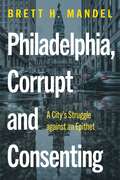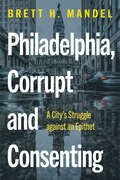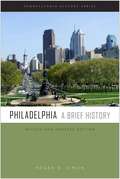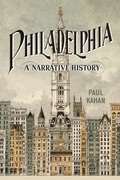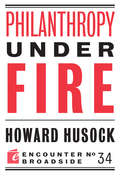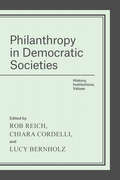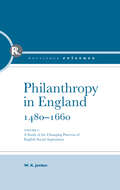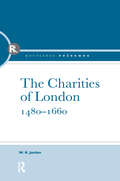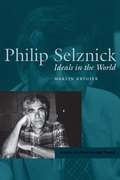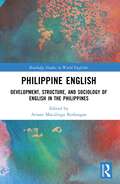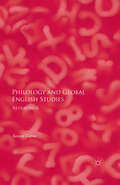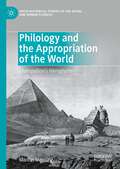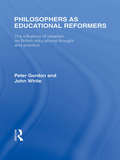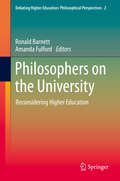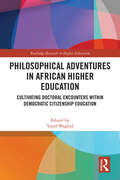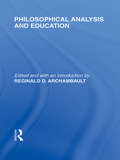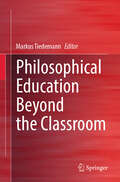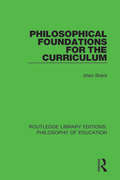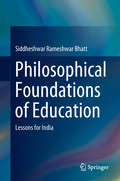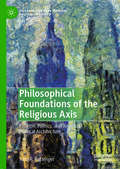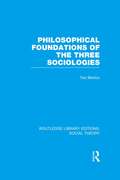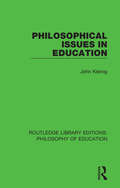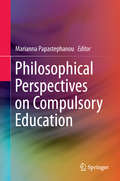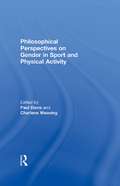- Table View
- List View
Philadelphia, Corrupt and Consenting: A City’s Struggle against an Epithet
by Brett H. MandelMore than a century after muckraking journalist Lincoln Steffens derided the city of Philadelphia as being “corrupt and contented,” Philadelphia struggles to rise above this unfortunate characterization. Philadelphia, Corrupt and Consentingis the story of a city’s confrontation with a history that threatens its future. Author Brett Mandel, who has been a reform-oriented government official and political insider, provides a detailed account of the corruption investigation of John Dougherty, one of the city’s most powerful political figures, in order to expose and explore networks of corruption. He examines the costs of corruption, both financial and nonpecuniary, and considers the opportunity cost that corruption imposes. Mandel explores the nature and development of Philadelphia’s unique culture of corruption, emphasizing how machine politics and self-dealing are entwined with city history, creating a culture that allows corruption to thrive. In addition, he provides practical, achievable policies and actions that can produce positive change in Philadelphia and elsewhere. Mandel seeks to provide insight into how our collective actions or inattention give consent to the corruption, as well as its roots and effects, and the reasons for its persistence. Philadelphia, Corrupt and Consenting is a critique, but above all, it is a call to action.
Philadelphia, Corrupt and Consenting: A City’s Struggle against an Epithet
by Brett H. MandelMore than a century after muckraking journalist Lincoln Steffens derided the city of Philadelphia as being “corrupt and contented,” Philadelphia struggles to rise above this unfortunate characterization. Philadelphia, Corrupt and Consentingis the story of a city’s confrontation with a history that threatens its future. Author Brett Mandel, who has been a reform-oriented government official and political insider, provides a detailed account of the corruption investigation of John Dougherty, one of the city’s most powerful political figures, in order to expose and explore networks of corruption. He examines the costs of corruption, both financial and nonpecuniary, and considers the opportunity cost that corruption imposes. Mandel explores the nature and development of Philadelphia’s unique culture of corruption, emphasizing how machine politics and self-dealing are entwined with city history, creating a culture that allows corruption to thrive. In addition, he provides practical, achievable policies and actions that can produce positive change in Philadelphia and elsewhere. Mandel seeks to provide insight into how our collective actions or inattention give consent to the corruption, as well as its roots and effects, and the reasons for its persistence. Philadelphia, Corrupt and Consenting is a critique, but above all, it is a call to action.
Philadelphia: A Brief History
by Roger D. SimonUnderstanding Philadelphia’s history requires that we understand that nothing is inevitable; history is not made by abstract forces, but by the decisions of real individuals as they conduct their lives. With its insightful analysis and engaging prose, Philadelphia provides an accessible and readable overview of the history of the Quaker City from its founding by William Penn to the deindustrialization and gentrification of the early twenty-first century. Roger Simon asserts that the history of Philadelphia is a story of the efforts to sustain economic prosperity while fulfilling community needs, and the continued tension between those priorities. Philadelphia devotes considerable attention to the evolving physical development of the city and to the social conditions and class structure of the people. Three dozen maps and illustrations enrich this edition, which has been fully updated and revised to reflect new scholarship on Philadelphia’s role in the post-industrial present and the diverse communities that incorporated women and minorities into the economic and social fabric of the city. Published in association with the Pennsylvania Historical Association
Philadelphia: A Narrative History
by Paul KahanA comprehensive history of Philadelphia from the region’s original Lenape inhabitants to the myriad of residents in the twenty-first centuryPhiladelphia is famous for its colonial and revolutionary buildings and artifacts, which draw tourists from far and wide to gain a better understanding of the nation’s founding. Philadelphians, too, value these same buildings and artifacts for the stories they tell about their city. But Philadelphia existed long before the Liberty Bell was first rung, and its history extends well beyond the American Revolution.In Philadelphia: A Narrative History, Paul Kahan presents a comprehensive portrait of the city, from the region’s original Lenape inhabitants to the myriad of residents in the twenty-first century.As any history of Philadelphia should, this book chronicles the people and places that make the city unique: from Independence Hall to Eastern State Penitentiary, Benjamin Franklin and Betsy Ross to Cecil B. Moore and Cherelle Parker. Kahan also shows us how Philadelphia has always been defined by ethnic, religious, and racial diversity—from the seventeenth century, when Dutch, Swedes, and Lenapes lived side by side along the Delaware; to the nineteenth century, when the city was home to a vibrant community of free Black and formerly enslaved people; to the twentieth century, when it attracted immigrants from around the world. This diversity, however, often resulted in conflict, especially over access to public spaces. Those two themes— diversity and conflict— have shaped Philadelphia’s development and remain visible in the city’s culture, society, and even its geography. Understanding Philadelphia’s past, Kahan says, is key to envisioning future possibilities for the City of Brotherly Love.
Philanthropy Under Fire
by Howard HusockIn Philanthropy Under Fire, author Howard Husock defends the American tradition of independent philanthropy from significant political and intellectual challenges which threaten it today. Although the U.S. continues to be the most charitable nation in the world, serious efforts seek to discourage traditional, personal charitable giving by changing the tax code, and directing philanthropy toward causes chosen by government. Some voices seek to narrow the very definition of philanthropy to include only direct redistribution of income from rich to poor. In contrast, Mr. Husock broadly defends philanthropy's causes-from the food pantry to the art museum to the university science lab-as both a source of effective new ideas and as a core aspect of democracy and liberty. In a new and original argument, he asserts that having broad impact does not require a marriage of philanthropy and government. Instead, he says, private programs growing out of the values held by their leaders-and imbued with those values-can have a wide impact through their influence on society's norms. In this sense, the good that private philanthropy does for American society can far transcend the good that it does for its immediate recipients.
Philanthropy in Democratic Societies: History, Institutions, Values
by Rob Reich Lucy Bernholz Chiara CordelliPhilanthropy is everywhere. In 2013, in the United States alone, some $330 billion was recorded in giving, from large donations by the wealthy all the way down to informal giving circles. We tend to think of philanthropy as unequivocally good, but as the contributors to this book show, philanthropy is also an exercise of power. And like all forms of power, especially in a democratic society, it deserves scrutiny. Yet it rarely has been given serious attention. This book fills that gap, bringing together expert philosophers, sociologists, political scientists, historians, and legal scholars to ask fundamental and pressing questions about philanthropy's role in democratic societies. The contributors balance empirical and normative approaches, exploring both the roles philanthropy has actually played in societies and the roles it should play. They ask a multitude of questions: When is philanthropy good or bad for democracy? How does, and should, philanthropic power interact with expectations of equal citizenship and democratic political voice? What makes the exercise of philanthropic power legitimate? What forms of private activity in the public interest should democracy promote, and what forms should it resist? Examining these and many other topics, the contributors offer a vital assessment of philanthropy at a time when its power to affect public outcomes has never been greater.
Philanthropy in England, 1480 - 1660: A study of the Changing Patterns of English Social Aspirations
by W. K. JordanThis study documents a momentous shift which occurred in men's aspirations for their society in the course of the sixteenth and seventeenth centuries. The author has examined gifts and bequests left for charitable causes over a period of nearly two centuries. in ten English counties, in order to assess the changing pattern of social aspirations and observe the different 'velocities of change' among the several social classes. Professor Jordan examines the problem of poverty in the early modern world and discusses the various measures taken by the Tudors and Stuarts to deal with the needs of the poor. He concludes that poverty was principally relieved by an immense outpouring of charitable wealth. This wealth flowed principally from an urban aristocracy determined not only to care for the hopelessly destitute but so to enlarge the 'area of opportunity' so that poverty could be prevented. At the same time, the Elizabethan law of charitable uses marshalled this generous wealth into effective agencies. The study closes with a full assessment of the noble achievements of the period: the founding of a widespread and effective system of education, the establishment of almshouses in all parts of England, and extraordinairy adn fertile experiments with the several agencies of social rehabilitation. The author records in this voluma a great and enduring historical achievement; he records as well the triumph of the secular preoccupations of mankind. This book was first published in 1959.
Philanthropy in England: A Study Of The Changing Patterns Of English Social Aspirations (Routledge Library Editions)
by W. K. JordanIn these works Professor Jordan studies the origins of modern social and cultural institutions in England. He is concerned with the momentous shift which occurred in men's aspirations for their society in the course of the sixteenth and seventeenth centuries, as reflected in the charities which were established by gifts and bequests. In a fascinating account of the measures taken by the Tudors and Stuarts to deal with the problem of poverty, Jordan concludes that it was principally dealt relieved by an immense outpouring of charitable wealth.
Philanthropy in England: A Study Of The Changing Patterns Of English Social Aspirations (Routledge Library Editions)
by W. K. JordanIn these works Professor Jordan studies the origins of modern social and cultural institutions in England. He is concerned with the momentous shift which occurred in men's aspirations for their society in the course of the sixteenth and seventeenth centuries, as reflected in the charities which were established by gifts and bequests. In a fascinating account of the measures taken by the Tudors and Stuarts to deal with the problem of poverty, Jordan concludes that it was principally dealt relieved by an immense outpouring of charitable wealth.
Philip Selznick: Ideals in the World
by Martin KrygierPhilip Selznick's wide-ranging writings engaged with fundamental questions concerning society, politics, institutions, law, and morals. Never confined by a single discipline or approach, he proved himself a major figure across a range of fields including sociology, organizations and institutions, leadership, political science, sociology of law, political theory, and social philosophy. This volume, the first book-length treatment of Selznick's ideas, discusses Selznick's various intellectual contributions. Reading across Selznick's work, one appreciates the coherence of his fundamental preoccupations-with the social conditions for frustration and the vindication of values and ideas. Exploring Selznick's insights into the nature and quality of institutional, legal, and social life, the book also examines his particular ways of thinking, concerns, values, and sensibility. Martin Krygier brings to light the coherence of Selznick's fundamental preoccupations, allowing readers to fully engage with his unique insights and distinctive moral-intellectual sensibility.
Philippine English: Development, Structure, and Sociology of English in the Philippines (Routledge Studies in World Englishes)
by Ariane Macalinga BorlonganPhilippine English is a comprehensive reference work on the history, sociology, and linguistic structure of Philippine English. It offers readers unprecedented access to a synthesis of the last 50 years of research into Philippine English and puts forward a new and better understanding of the phenomenon of the nativization of English in the Philippines and the emergence of Philippine English. This definitive resource covers in great length and depth all that is currently known about the new English. The chapters offer detailed descriptions of Philippine English at various linguistic levels in addition to examining the psychosociolinguistic factors which shaped the language. Offering discussions of practice, language policy, language education, language teaching, and the relevance of English in various social phenomena in the Philippines, readers will find everything they need to know on theory, methodology, and application in the study of Philippine English.
Philology and Global English Studies: Retracings
by Suman GuptaThis book retraces the formation of modern English Studies by departing from philological scholarship along two lines: in terms of institutional histories and in terms of the separation of literary criticism and linguistics.
Philology and the Appropriation of the World: Champollion’s Hieroglyphs (Socio-Historical Studies of the Social and Human Sciences)
by Markus MesslingThis book sheds new light on the work of Jean-François Champollion by uncovering a constellation of epistemological, political, and material conditions that made his decipherment of Egyptian hieroglyphs possible. Champollion’s success in understanding hieroglyphs, first published in his Lettre à M. Dacier in 1822, is emblematic for the triumphant achievements of comparative philology during the 19th Century. In its attempt to understand humanity as part of a grand history of progress, Champollion’s conception of ancient Egypt belongs to the universalistic aspirations of European modernity. Yet precisely because of its success, his project also reveals the costs it entailed: after examining and welcoming acquisitions for the emerging Egyptian collections in Europe, Champollion travelled to the Nile Valley in 1828/29, where he was shocked by the damage that had been done to its ancient cultural sites. The letter he wrote to the Egyptian viceroy Mehmet Ali Pasha in 1829 demands that excavations in Egypt be regulated, denounces European looting, and represents perhaps the first document to make a case for the international protection of cultural goods in the name of humanity.
Philosophers as Educational Reformers (International Library of the Philosophy of Education Volume 10): The Influence of Idealism on British Educational Thought
by John White Peter GordonThis volume assesses how far the ideas and achievements of the 19th century British Idealist philosophical reformers are still important for us today when considering fundamental questions about the structure and objectives of the education system in England and Wales. Part 1 examines those ideas of the Idealists, especially T. H. Green, which had most bearing on the educational reforms carried out between 1870 and the 1920s and traces their connection with the philosophy and educational theory of Hegel and other post-Kantians. Part 2 is an historical survey, concentrating on the innovations in the organization and contents of education in England and Wales brought about by the administrators and educationists educated in philosophical idealism. Part 3 considers what relevance the philosophical and practical ideas of this interconnected group of reformers have to education today.
Philosophers on the University: Reconsidering Higher Education (Debating Higher Education: Philosophical Perspectives #2)
by Ronald Barnett Amanda FulfordThis book shows the significance of the thinking of philosophers (and other key thinkers) in understanding the university and higher education. Through those explorations, it widens and substantially adds to the emerging philosophy of higher education. It builds on the historical literature on the idea of the university, and provides higher education scholars with highly accessible introductions to the thinking of key philosophers and thinkers, alerting them to a set of literature that otherwise might not be encountered. Until very recently, most of the debate on higher education – both in the public domain and in the scholarly literature – has been conducted with little regard to the philosophical literature. This is odd for two reasons. Firstly, much of the historical literature on the idea of the university – over the past two hundred years – has been written by philosophers and their thinking has largely gone unmined. Second, and perhaps even more importantly, many of the issues in the higher education debate are either philosophical in their nature, or require reflective thinking, and there lies to hand huge resources in the philosophical literature that can help in working through those issues. Issues such as what is to count as knowledge (in the university), wisdom, voice, democracy, culture, what it is to ‘be’ a student or academic, academic freedom, communication, work and disciplinarity cry out for the kind of insights that the philosophical literature – very broadly understood – can offer. This book attempts precisely to do this, to show how the work of key thinkers can help in deepening the higher education debate. Each chapter focuses on an individual thinker, giving both an insight into the thinker in question and accessibly drawing out something of their thinking and showing its significance in understanding the university and higher education. The editors provide a full-length introduction that marks out this large territory and prepares the ground for the reader.The book impressively builds a rich meshwork of careful and thorough thinking around the university and higher education by way of introducing 14 important philosophers on timely subjects such as culture and the university, higher education and democracy, and the role of the university. The volume is a great contribution to the important task of deepening the debate about higher education and the university, through introducing important philosophers in ways that might help the university and higher education work through some of the issues and challenges that it is currently facing. As such, this book is essential reading for anyone wanting to wander and wonder deeper into the core purposes and possibilities of higher education in the good companionship of outstanding thinkers and distinguished academics on these matters. A playground for philosophical thought and adventure.Rikke Toft Nørgård, Associate Professor, Aarhus University, Denmark'This book is an excellent introduction to a wide range of famous thinkers and what they have to say about the university and higher education today. It goes beyond the contemporary preoccupation with metrics, based on managerialism, and takes a much needed philosophical look at what higher education should be, or should aspire to be.'Assoc. Prof. Stephen Loftus, Foundational Medical Studies, Oakland University William Beaumont School of Medicine, USA
Philosophical Adventures in African Higher Education: Cultivating Doctoral Encounters within Democratic Citizenship Education (Routledge Research in Higher Education)
by Yusef WaghidThis seminal volume delves into some of the doctoral research and pedagogical experiences within an African higher education context, making a case for the transformative potential of education and the integration of African indigenous philosophies into global educational practices.Through a collection of vivid narratives, the book situates philosophy of higher education by embodying the doctoral researcher and their initiation into academic life, revealing how doctoral pursuits in African higher education are not simply academic endeavours but deeply philosophical adventures that challenge, critique, and reimagine the role of education in society. Chapters advocate for a dynamic educational system that, rooted in African philosophies, nurtures democratic citizenship, embraces critical engagement, and fosters social justice. A call to action for researchers, students, and policy makers alike to view doctoral research as a powerful catalyst for change, the book offers fresh perspectives on addressing the continent's unique challenges, contributing to a more just and inclusive world.Ultimately considering the potential of academic research to shape the future of societies, both within Africa and globally, the book will appeal to researchers, academics and postgraduate students involved with the philosophy of education, higher education, and citizenship education, as well as these areas in African contexts specifically.
Philosophical Analysis and Education (International Library of the Philosophy of Education Volume 1)
by Reginald D. ArchambaultWhen originally published in 1965 this book reflected some of the new thinking among philosophers regarding the role of the discipline in its investigation of central issues in educaton. The essays are grouped into four major sections: The Nature and Function of Educational Theory; The Context of Educational Discussion; Conceptions of Teaching; and The Essence of Education. The concepts dealt with are of the first importance to any practical or theoretical discussion in education and the editor provides a generous introduction to the essays to aid the reader in his analysis of the issues.
Philosophical Education Beyond the Classroom
by Markus TiedemannDidactics of philosophy and ethics demands problem based orientation and relevance for real life experiences. However, excursions, extracurricular places of learning or 'outdoor education' have hardly been taken into account. A systematic exploration of possible cooperations, synergy effects or incompatibilities has not yet been carried out. The present volume attempts to close this gap and to create an initial basis for further research, testing and discussion. It is intended to make a contribution to teacher training at universities and study seminars as well as to exploratory research in subject didactics.
Philosophical Foundations for the Curriculum (Routledge Library Editions: Philosophy of Education #3)
by Allen BrentIn this book, first published in 1978, Allen Brent sets out to explore some of the questions raised by theorists and philosophers regarding curriculum. He starts by investigating whether all knowledge is the product of social conditions of particular times or places, or whether there is some kind of universal framework implicit in the claims to knowledge which men make. He looks at the work of Plato, Newman, Freire and Hirt and how, each of them in a strikingly different way, they have tried to give us an objective basis for curriculum judgements and how the validity of that basis is attacked by contemporary sociologists of knowledge. This book is aimed primarily at students who are concentrating on the philosophy of education or curriculum theory.
Philosophical Foundations of Education: Lessons for India
by Siddheshwar Rameshwar BhattThis book provides a philosophical foundation to the theory and practice of education from the Indian perspective. It is guided by an 'axionoetic' approach to education and therefore it deals with the epistemological foundation and value orientation of education. The author discusses the ontological, epistemological, logical, ethical and axiological bases of education in a holistic and integrated manner. The author maintains that education is a planned, methodical and purposive enhancement of human potentialities as a natural development. This presupposes correct and adequate formulation of the objectives and goals of education as per the needs and aspirations of pupils. Education also equips individuals for a good quality of life. Keeping in view the applied dimension of philosophy, this book analyses practical issues of moral education like character building value-negativism in the context of education. It also deals with issues concerning peace, sustainable development, sustainable judicious consumption etc. which should have a bearing on educational policies and programmes.
Philosophical Foundations of the Religious Axis: Religion, Politics, and American Political Architecture (Palgrave Studies in Religion, Politics, and Policy)
by John R. PottengerThis book discusses the evolution of three philosophical foundations from the twelfth through the eighteenth centuries that converged to form the basis of liberal democracy’s approach to the place and role of religion in society and politics. Identified by the author as a “religious axis,” the period of convergence promoted rational and empirical investigation, enabled the development of diverse religious beliefs, and affirmed religious liberty and expressions amidst pluralist politics. The author shows that the religious axis’ three philosophical foundations—epistemic, axiological, and political—undergird the political architecture of American liberal democracy that designed a containment structure to protect a vast array of religious expressions and encourage their presence in the public square. Moreover, the structure embodied a democratic ethos that drives religious and political pluralism—but within limits. The author argues that this containment structure has paradoxically ignited frenzied fires of faith that politically threaten the structure’s own limits.
Philosophical Foundations of the Three Sociologies (Routledge Library Editions: Social Theory)
by Ted BentonAn extended historical and philosophical argument, this book will be a valuable text for all students of the philosophy of the social sciences. It discusses the serious alternatives to positivist and empiricist accounts of the physical sciences, and poses the debate between naturalism and anti-naturalism in the social sciences in new terms. Recent materialist and realist philosophies of science make possible a defence of naturalism which does not make concessions to positivism and which recognizes the force of several of the anti-positivist arguments from the main anti-naturalist (neo-Kantian) tradition. The author presents a critical evaluation of empiricist and positivist theories of knowledge, and investigates some classic attempts at using them to provide the philosophical foundation for a scientific sociology. He takes the Kantian critique of empiricism as the starting point for the main anti-positivist and anti-naturalist philosophical approaches to the social studies. He goes on to investigate the inadequacy of post-Kantian arguments from Rickert, Weber, Winch and others, both against non-positivist forms of naturalism and as the possible source of a distinctive philosophical foundation for the social studies. The book concludes with a critical investigation of the Marxian tradition and an attempt to establish the possibility of a materialist and realist defence of the project of a natural science of history, which escapes the fundamental flaws of both positivist and neo-Kantian attempts at philosophical foundation.
Philosophical Issues in Education (Routledge Library Editions: Philosophy of Education #11)
by John KleinigThe philosophy of education is an important component of most education courses. The subject is often split into two traditions, one emphasising the use of analytic philosophy, the other engaging in radical social criticism. This book, first published in 1982, brings together the strengths of both traditions and takes stock of the debate. This study provides an interesting introduction to all the major philosophical issues in education which is different to many other works on the subject.
Philosophical Perspectives on Compulsory Education
by Marianna PapastephanouFrom antiquity to the present, schools of some form have, in one way or other, been involved in the material and symbolic reproduction of societies. Such diachronic resilience, along with the synchronic omnipresence of schooling often makes schools appear as natural, self-evident and unavoidable. This naturalization of schooling is then extended to its modern specification as compulsory in a universalist fashion. This book does not only seek to explore what is left of older debates on compulsory education in the years' hindsight but also to associate the discussion of schooling with new theoretical developments and new emphases. It contains a first part, which operates, primarily, at the conceptual and justificatory level and reserves a, more or less, qualified welcome to a revisited notion of compulsory. And it supplements this first part with a second, more applied one that focuses on specific aspects of compulsory schooling and/or education. From Luther down to John Stuart Mill and John Dewey, compulsory education has been heralded either as a vehicle of social coordination and individual well-being, or as a vehicle of democratization and progress, or as a means for protecting the rights of the young and of society, and so on and so forth. But there have also been periods of challenge and denaturalization of compulsory education, producing a range of interesting and spirited debates not only on matters of educational legality but also on matters that boil down to broader philosophical questions about the self and the world. Without neglecting the lasting significance of older debates, argumentation over schooling, its character and its scope can be recast in the light of current philosophical educational debates. Given the fact that failure adequately to mine such connections leads to a lack in philosophical-educational engagement with one of the most central pedagogical practices of the contemporary world, namely, the school, the book aspires to remedy this lack and to put together work that addresses those connections through the highly original and innovative work of its contributors. The subtext in all contributions is a vision of educational transformation in one way or other. All chapters (from the most theoretical to the most practice-related) promote a version of a recast or redirected compulsory schooling.
Philosophical Perspectives on Gender in Sport and Physical Activity
by Paul Davis Charlene WeavingThere are a broad variety of sex and gender resonances in sport, from the clash of traditional ideas of femininity and athleticism represented by female athletes, to the culture of homophobia in mainstream male sport. Despite the many sociological and cultural volumes addressing these subjects, this collection is the first to focus on the philosophical writings that they have inspired. The editors have selected twelve of the most thought-provoking philosophical articles on these subjects from the past thirty years, to create a valuable and much needed resource. Written by established experts from all over the world, the essays in this collection cover four major themes: sport and the construction of the female objectification and the sexualization of sport homophobia sex boundaries: obstruction, naturalization and opposition. The book gathers a broad range of philosophical viewpoints on gender in sport into one unique source, subjecting the philosophical origins and characteristics of some of the most controversial topics in sport to rigorous scrutiny. With a balance of male and female contributors from both sides of the Atlantic, and a comprehensive introduction and postscript to contextualize the source material, Philosophical Perspectives on Gender in Sport and Physical Activity is essential reading for all students of the philosophy of sport, sport and gender, and feminist philosophy.
